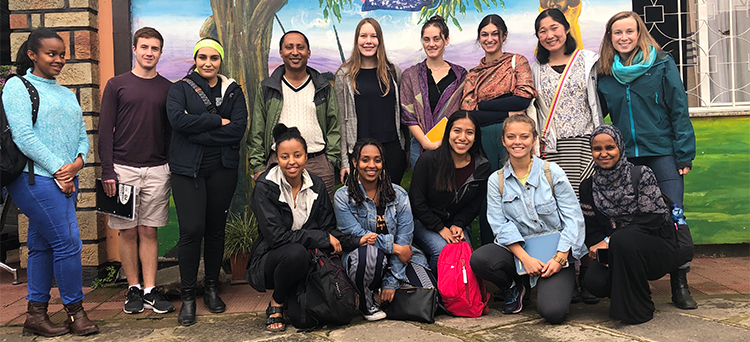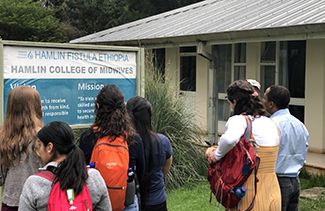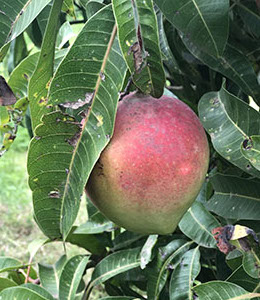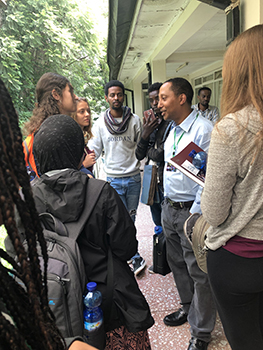Ethiopia maternal and child health: Raising students to be epidemiology leaders

Professor Daniel Enquobahrie, PhD, MD, MPH, stood outside of Hamlin Fistula Ethiopia, a charitable organization that serves both as a treatment center for childhood fistulas and a college to train midwives. Dr. Enquobahrie and undergraduate students from the University of Washington (UW), crowded around a local physician to learn about the organization’s public health work. That month, the students had visited hospitals, health centers, and non-governmental organizations throughout Ethiopia to gain practical knowledge of maternal and child health (MCH) successes and challenges.

This was the first time many of the students were exposed to global public health in practice. Thanks to Dr. Enquobahrie’s lifelong dedication to MCH, this experience will potentially have a lasting impact on the future career trajectories of the undergraduate students.
Dr. Enquobahrie, associate professor of epidemiology and director of the UW Center of Excellence in Maternal and Child Health, knew firsthand the healthcare needs in Ethiopia.
Dr. Enquobahrie received a medical degree from Addis Ababa University, and served as external advisor to the Strengthening Care Opportunities through Partnerships in Ethiopia (SCOPE) program.
Even though the conditions in Ethiopia have improved in the past few decades, Dr. Enquobahrie notes that “the maternal and child populations suffer greatly from preventable conditions and can benefit from concerted effort to promote public health.”
Dr. Enquobahrie knew he wanted to introduce students to those public health efforts in action. After reviewing current study abroad options, Dr. Enquobahrie noticed that that were few options that focused on MCH or provided exposure to East Africa. In response, Dr. Enquobahrie and program co-director Dr. Brandon Guthrie developed an innovative new study abroad program in Ethiopia, leveraging Dr. Enquobahrie’s experience in the country to build an interactive itinerary for undergraduate students.
During their trip, UW students learned from local stakeholders and benefited from collaborations with universities in Addis Ababa and Gondar. The program also invited local students from Ethiopian universities into the classroom. This interaction allowed UW students to learn about Ethiopia’s culture and network with their future colleagues from around the world.
Hana Arega, UW pre-med student, was grateful for the immersive nature of the program both academically and socially. Arega was born in Ethiopia but moved to the United States when she was eleven. The study abroad program offered her the chance to return to her home country for first time while advancing her career interests.
Arriving in Ethiopia, Arega felt welcomed in by the local student’s generosity. “One student invited us over for a home cooked meal and taught us how to read the Amharic alphabet,” Arega recalled.

On top of cultural connections, Arega appreciated the creative public health solutions she witnessed every day. Arega particularly enjoyed one site visit to the Kossoye Development Project garden near Gondar Hospital.
“The garden project helped mothers and children who need nutritional support and provided patients with their own seeds once they left the hospital,” she described.
The Kossoye Development Project was made possible by Dr. Dennis Carlson, once the Dean of the Public Health College at the University of Gondar, and is now directed by Dr. Andrew Carlson. The project addressed patient’s holistic needs and encouraged sustainable health in a way that fascinated Arega. “The visit gave me real-world exposure to what public health really is and how important it is in every aspect of someone’s life.”
Dr. Enquobahrie intended to ignite student’s interest in both MCH and epidemiology. Dr. Enquobahrie says that he has been committed to MCH since he started working in epidemiology. “MCH is close to my heart,” he says with a smile. “One of my favorite things as a professor is sharing that passion with my students.” Dr. Enquobahrie continues to meet with students who went on the trip to provide academic and career guidance, and he is happy to say that many students are considering future careers in epidemiology and MCH.
In Summer 2020, Dr. Enquobahrie will bring another cohort of students to Ethiopia to learn about MCH and collaborate on a new study abroad experience in Rwanda with Dr. Esther Chung, from the UW School of Medicine.
Dr. Enquobahrie is committed to expanding opportunities for excited graduate and undergraduate students. As Dr. Enquobahrie says, “these students will be eventual leaders in the field of maternal and child public health.”

Hana Arega is one future leader. After graduating, Arega plans to pursue a masters in epidemiology and concentrate in maternal and child studies. She says that the program gave her the courage and knowledge that she will use in a rewarding career in epidemiology.
“Epidemiologists make real, noticeable changes in the world,” and Arega wants to be one of those future changemakers. “Studying in Ethiopia reminded me of what I am working towards and why I need to keep going; it was really motivational.”